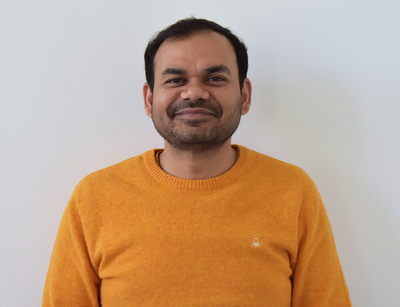Roopesh Anand joins IMB as a Group Leader
The Institute of Molecular Biology (IMB) is pleased to welcome Dr Roopesh Anand as a new Group Leader. Roopesh joins us from The Francis Crick Institute in the UK, where he previously worked as a postdoctoral researcher. His lab at IMB will elucidate the mechanisms that underlie homology-directed repair of double-strand breaks in DNA. Such repair mechanisms are often disrupted in cancers, accelerated ageing and various genetic disorders.
Our DNA is constantly damaged by exposure to UV radiation from sunlight, chemicals and X-rays. In addition, internal reactions within the cell produce toxic compounds that can damage our DNA. If the damaged DNA is incorrectly repaired this can result in harmful mutations that eventually lead to cancer and premature ageing. To keep our bodies healthy and functional, it is therefore extremely important that our cells are able to repair their DNA. Defective DNA repair (e.g. due to inherited mutations) is known to cause neurological and developmental disorders, as well as premature ageing syndromes.
One of the most dangerous types of DNA damage is double-strand breaks (DSBs), where both strands of the DNA are broken, leaving the cell without an intact strand to restore the original DNA sequence. Fortunately, most organisms have two copies of each chromosome. Therefore, one option for repairing DSBs is to use the DNA from the second copy as a template to repair the broken DNA. This is known as homology-directed repair. Cells have evolved numerous ways to do this, ensuring that if the main repair method fails there is always another backup method available. However, some pathways are more prone to making mistakes while repairing than others, which can result in mutations that cause disease.
Roopesh’s lab focuses on identifying the proteins involved in each of the different DSB repair pathways and understanding how they work. By understanding the mechanisms that cells use to repair DSBs, his work can help us better understand how cancers arise and identify proteins that could be targeted with drugs to treat them.
Further details
Roopesh Anand is a Group Leader at the Institute of Molecular Biology (IMB). Further information about research in the Anand lab can be found at www.imb.de/anand.
About the Institute of Molecular Biology gGmbH
The Institute of Molecular Biology gGmbH (IMB) is a centre of excellence in the life sciences that was established in 2011 on the campus of Johannes Gutenberg University Mainz (JGU). Research at IMB focuses on the cutting-edge fields of epigenetics, genome stability, ageing and RNA biology. The institute is a prime example of successful collaboration between a private foundation and government: The Boehringer Ingelheim Foundation has committed 154 million euros to be disbursed from 2009 until 2027 to cover the operating costs of research at IMB. The State of Rhineland-Palatinate has provided approximately 50 million euros for the construction of a state-of-the-art building and is giving a further 52 million in core funding from 2020 until 2027. For more information about IMB, please visit: www.imb.de.
About the Centre for Healthy Ageing
The Centre for Healthy Ageing (CHA) is a virtual research centre launched in 2021 that brings together scientists in basic and clinical research from across Mainz that focus on ageing and age-related diseases. These findings should be used to promote healthy ageing and to find treatments that could prevent or cure age-related disease. For more information, please visit: www.cha-mainz.de.
Boehringer Ingelheim Foundation
The Boehringer Ingelheim Foundation is an independent, non-profit organization that is committed to the promotion of the medical, biological, chemical, and pharmaceutical sciences. It was established in 1977 by Hubertus Liebrecht (1931–1991), a member of the shareholder family of the Boehringer Ingelheim company. Through its funding programmes Plus 3, Exploration Grants and Rise up!, the Foundation supports excellent scientists during critical stages of their careers. It also endows the international Heinrich Wieland Prize, as well as awards for up-and-coming scientists in Germany. In addition, the Foundation funds institutional projects in Germany, such as the Institute of Molecular Biology (IMB) and the European Molecular Biology Laboratory (EMBL) in Heidelberg.
Press contact for further information
Dr Ralf Dahm, Director of Scientific Management
Institute of Molecular Biology gGmbH (IMB), Ackermannweg 4, 55128 Mainz, Germany
Phone: +49 (0) 6131 39 21455, Email: press(at)imb.de
